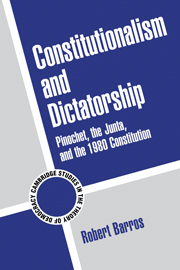Book contents
- Frontmatter
- Contents
- Foreword
- Acknowledgments
- Abbreviations
- Introduction
- 1 Dictatorship, Legality, and Institutional Constraints
- 2 The Constitution of the Exception: Defining the Rules of Military Rule
- 3 The Constitution and the Dictatorship: The Supreme Court and the Constitutionality of Decree-Laws
- 4 The Shadowy Boundary between Force and Law: The Judiciary, Repression, and the Cosmetic Limitation of Emergency Powers
- 5 Constitutionalization without Transition: Prompting the Dual Constitution of 1980
- 6 The Permanent Text: Constitutional Controls or Military Tutelage?
- 7 Even Custom Shoes Bind: Military Rule under the Constitution, 1981–1988
- 8 Military Dictatorship and Constitutionalism in Chile
- References
- Index
Foreword
Published online by Cambridge University Press: 10 December 2009
- Frontmatter
- Contents
- Foreword
- Acknowledgments
- Abbreviations
- Introduction
- 1 Dictatorship, Legality, and Institutional Constraints
- 2 The Constitution of the Exception: Defining the Rules of Military Rule
- 3 The Constitution and the Dictatorship: The Supreme Court and the Constitutionality of Decree-Laws
- 4 The Shadowy Boundary between Force and Law: The Judiciary, Repression, and the Cosmetic Limitation of Emergency Powers
- 5 Constitutionalization without Transition: Prompting the Dual Constitution of 1980
- 6 The Permanent Text: Constitutional Controls or Military Tutelage?
- 7 Even Custom Shoes Bind: Military Rule under the Constitution, 1981–1988
- 8 Military Dictatorship and Constitutionalism in Chile
- References
- Index
Summary
Why a book about a dictatorship in a series on theories of democracy?
Constitutionalism and Dictatorship: Pinochet, the Junta, and the 1980 Constitution describes the process of legalization of a dictatorship. Since the story is full of drama, I will not reveal the plot. But the ending is known. A brutal military dictatorship, unadorned by any civilian institutions, handling opponents with arbitrary repression, departed from power according to the rules it set nine years earlier. Why dictators set these rules and why they obeyed them is the subject of Robert Barros's story. The puzzle this story raises, however, has deep consequences for understanding the rule of law under democracy.
In the classical liberal view, only a divided government can be a limited one. As Hampton (1994) and Kavka (1986) argued against Hobbes, this is the foundation of the rule of law. Moreover, a mere separation of powers is not enough, since separation of powers leaves unlimited latitude to the legislature, decisions of which must be implemented by all other branches of government. What is needed is a system of checks and balances that makes it impossible for any particular authority to undertake actions unilaterally, without the cooperation or consent of some other authorities.
The Madisonian view asserts that a government divided in this manner will be constrained to act according to rules.
- Type
- Chapter
- Information
- Constitutionalism and DictatorshipPinochet, the Junta, and the 1980 Constitution, pp. xi - xivPublisher: Cambridge University PressPrint publication year: 2002
- 1
- Cited by

